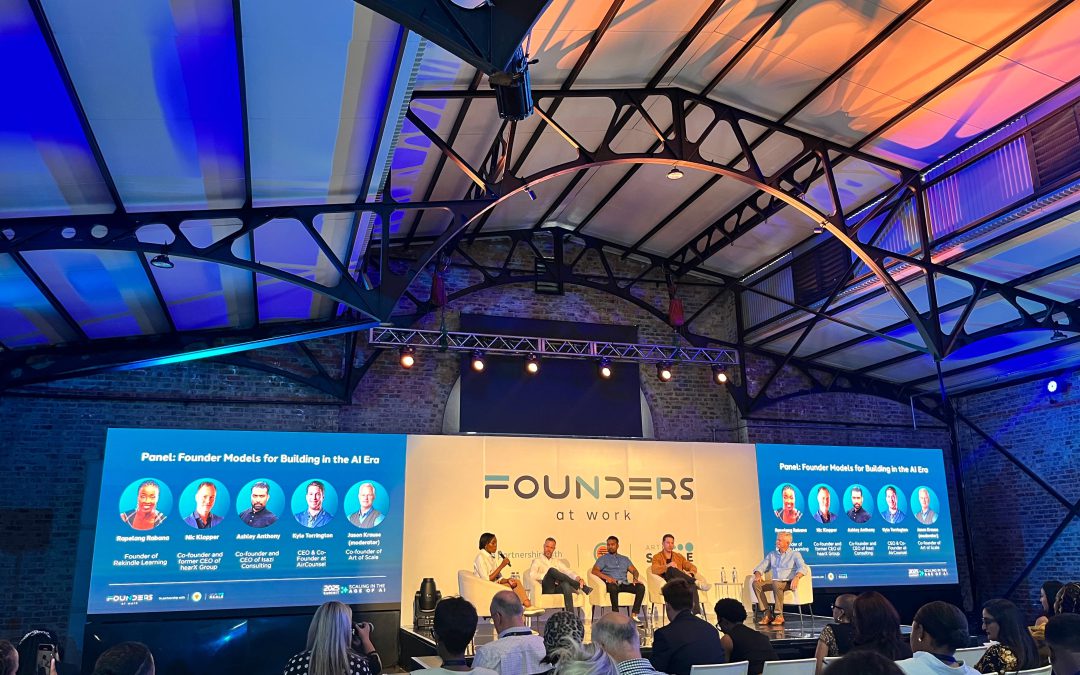Networks of expert guidance and peer support have become essential infrastructure for navigating an AI-transformed competitive landscape. The founders who understand this will be the ones who thrive in the decades ahead.
The world stands at an inflection point. While founders focus on the familiar challenges of scaling – hiring, systems, capital – a more fundamental shift is reshaping the competitive landscape beneath their feet.
The artificial intelligence revolution represents both a challenge and an opportunity: it is redefining how value is created and captured, in ways that will unfold unevenly across industries for years to come.
Two decades ago, the platform revolution caught entire sectors off guard. Airbnb transformed hospitality without owning a single hotel room. Uber revolutionised transportation without owning vehicles. Netflix redefined entertainment while traditional media companies struggled to adapt. These disruptions displaced business models but also unlocked opportunities for those who adapted quickly.
The AI revolution promises disruption of even greater magnitude. We are witnessing a convergence of computational power, energy and data availability, and algorithmic sophistication that rivals the transformative impact electricity had on industrial society.
Yet, just as electrification reached industries at different speeds, AI adoption will not be uniform—some sectors will face immediate upheaval, while others will experience more gradual change.
Depending on their sector, the implications for scaling businesses will be profound. Some tasks that once required teams of specialists can increasingly be executed almost instantly and at marginal cost. Businesses built on charging for expertise and labor to do these tasks will need to rethink their business models.
At the same time, founders who embrace AI co-pilots for themselves and their teams can gain strategic leverage—freeing up time, augmenting talent, and unlocking growth paths that were previously inaccessible.
Over the next several years, many businesses will be significantly reshaped by this technological wave. Some enterprises may fail to adapt quickly enough, but others will harness AI to deliver more value to customers.
The determining factor will not be sheer resources—it will be whether leaders commit to riding this AI wave by learning fast, experimenting with practical use cases, and adapting as the technology evolves. The rapidly evolving nature of this transformation creates a premium on access to current intelligence and actionable insights.
The most effective response combines two elements:
Firstly, internal experimentation—starting with small, high-leverage applications of AI within the business—and secondly, external connection to networks of thought leaders and peer founders on the cutting edge.
The most valuable learning happens where pioneers share their real-world experiences of applying AI tools, navigating integration challenges, and discovering new possibilities.
This is precisely why initiatives like FNB and Art of Scale’s Founders at Work programme have positioned AI as a central theme. By combining timeless principles, cutting-edge insights, and access to a community of peers actively navigating similar challenges, the programme creates a platform for scaling founders to learn, experiment, and grow together.
The convergence of AI advancement and scaling challenges creates an opportunity for founders who approach both with strategic intent. Rather than viewing technological change as an external threat, forward-thinking leaders can leverage it as a catalyst for accelerated growth.
The key lies in staying close to the leading edge of practice, building organisational adaptability, and maintaining connection to the global conversation around AI and scaling.
The Founders at Work programme launched with a workshop on Scaling in the AI era on 16 October in Johannesburg. It marks the start of a platform designed to connect founders with the networks, insights, and peer support essential for thriving in the age of artificial intelligence.



